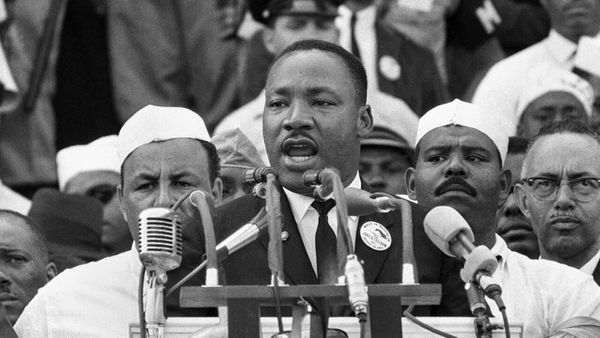
As conflict in Sudan escalates, it is becoming clear that the Rapid Support Forces has returned to Darfur to complete the genocide it began 20 years ago. The RSF is the Janjaweed rebranded, the “devils on horseback” used by the Sudanese government from 2003 to implement widespread and systematic crimes against non-Arab communities across Darfur. The RSF was, and still is, commanded by Gen Mohamed Hamdan “Hemedti” Dagalo.
In recent weeks, what we knew was coming has been confirmed. Yale University’s Conflict Observatory, which uses a combination of satellite imagery, Nasa thermal-detection data and open-source analysis, found evidence of the “targeted destruction of at least 26 communities” by the RSF between 15 April and 10 July. Mass graves have been discovered, and satellite imagery shows entire urban neighbourhoods and villages have been burned down.
Sexual violence is once again an evident component of RSF strategy. Facilities necessary for survival are being deliberately destroyed, from homes, schools and hospitals to water, electricity and communications infrastructure.
This is what you do when you want to permanently remove a people. And terrible as this evidence is, the public reports and verified cases will still represent a massive undercount of what is actually taking place.
This hellish trajectory will gather momentum, and there is a real risk the RSF will now take aim at larger targets, such as the town of El Fasher, where there are at least 600,000 displaced people now largely housed in three camps.
The RSF appears to be taking advantage of an international response to the crisis that is prioritising resolution between the warring generals – Hemedti and Abdel Fattah al-Burhan, head of Sudan’s armed forces – but so far is proving unable or unwilling to respond to the mass violence being unleashed across Darfur.
From the second world war and the Holocaust to the wars of Yugoslav succession and genocide against Bosnia’s Muslims, this deeply flawed assumption that ending armed conflict will also end campaigns of identity-based mass violence has meant catastrophic failures to protect vulnerable people and prevent massive losses of life. Failure to acknowledge these distinctions in Sudan will likewise be devastating for Darfur.
The deliberate violence in Darfur requires an urgent response. However, doing so confers no legitimacy on Sudanese armed forces, which have been committing human rights violations elsewhere in Sudan in pursuit of reimposing Islamist authoritarian rule.
What has been reported in Darfur should be seen as the first wave of a strategy that will become more extreme if left unchecked. The RSF command is watching what the world will do before it escalates. We have the narrowest of windows in which to act.
The nature, intent and perpetrators of atrocities must be named and condemned. Last week the UK’s development minister, Andrew Mitchell, said crimes against humanity was “entirely right” to describe what is taking place. It is surprising that other countries – in particular the US, which has an established mechanism to do so – have yet to follow suit. Global condemnation can give perpetrators cause to hesitate; this buys time, which saves lives.
The roles played by state leaders via back-channel diplomacy, and in leveraging bilateral and personal relationships, often make the greatest difference amid such delicate tipping points. Leadership from the British prime minister, Rishi Sunak, and the foreign secretary, James Cleverly, along with Mitchell, in publicly condemning mass atrocities in the strongest possible terms – and getting on the phone to urge their counterparts to do the same – is therefore critical.
The glare of the international spotlight allows perpetrators fewer places to conceal their crimes. As current president of the UN security council, the UK should be using every forum and mechanism to bring attention, investigation, documentation and media coverage. Impunity thrives in the shadows.
The UK must listen far more to the people who know and understand this violence best. I told the House of Commons foreign affairs select committee last month that the UK made a catastrophic error in trusting the men with guns rather than listening to the people who were feeling increasingly unsafe. It would be a graver mistake still to assume now that designing protective strategies is the singular purview of military experts in western capitals.
The UK needs to establish urgently an emergency communications channel between Whitehall and experts in Sudan, Darfur, Chad and the Darfuri community here in the UK, who will be among the first to know when the RSF advance or alters course.
Ultimately, as the chairs of both the international development and foreign affairs select committees have repeated, a protective wedge must be placed between people at risk and the RSF. The full spectrum of protective options must be fully considered, including but not limited to the rapid deployment of high-level international observers, the presence of UN political and human rights experts as “eyes and ears” on the ground, and peacekeeping forces that can protect civilians.
None of these options is easy – we know the UN security council is broken, and securing permission for access will be a diplomatic feat on its own – but difficulty cannot become an excuse not to persevere when any kind of international presence will help to pause attacks and buy time.
We knew the spectre of identity-based mass violence was returning to Sudan. We knew it when Hemedti instigated a massacre in Khartoum after the people’s revolution in 2019; we knew it when Burhan led the military coup in 2021.
If the UK’s policy is indeed “to maximise our ability to take effective action to prevent and respond to atrocities”, comprehensive action must be taken now. Otherwise, we will have to accept that we stood by 20 years after genocide began in Darfur, allowing the very same perpetrators to complete the crime.
• Kate Ferguson is co-executive director of the charity Protection Approaches, which works to prevent identity-based violence







